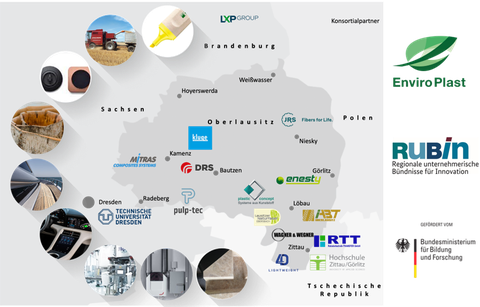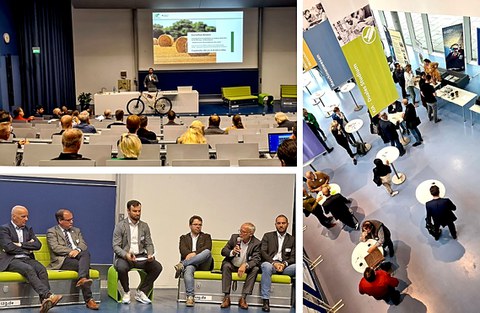Oct 16, 2024
EnviroPlast: Biogenic residues as the key to sustainable plastics production
On September 26, 2024, the kick-off event for the RUBIN alliance EnviroPlast ("Environmentally friendly plastic parts from biogenic residues for the automotive and construction industry - bioeconomic value creation in Lusatia") took place in Zittau.
The RUBIN alliance EnviroPlast makes a significant contribution to the production and use of sustainable technical plastic parts from biogenic residues. The interdisciplinary consortium consists of 15 funded and 10 associated partners from industry and science, mostly from Upper Lusatia in Saxony, and covers the entire spectrum of bioeconomic value creation from harvesting to application and recycling. TU Dresden is directly involved in two of the alliance's three joint projects.
One of EnviroPlast 's goals is to use biogenic residues, in particular fibrous materials such as sawn timber residues, grain straw and chaff as well as green waste, in a targeted manner as a raw material for the production of biopolymers. In Germany, up to 200 million tons of residual materials containing fibres are produced every year, which have so far remained largely unused or have only been thermally recycled. EnviroPlast wants to tackle this challenge and reduce the amount of additional agricultural land required for plastics production by using biogenic residues. This should significantly improve the conservation of resources and have a positive impact on the plastics industry's carbon footprint.
Currently, meeting the demand for plastics in Germany with conventional agricultural products would require an enormous amount of land, which would have a significant impact on food production. EnviroPlast offers a solution that combines sustainability with economic efficiency without significantly changing existing economic processes.
Another central goal of the project is the use of fiber-containing residues as reinforcing and filling material in plastics. This reduces the amount of plastic required and the use of synthetic fibers and additives, which not only reduces the carbon footprint of manufacturing companies, but also saves material costs.
EnviroPlast takes a holistic approach to ensure high quality plastic parts made from biogenic, regional waste materials that meet the requirements of the automotive and construction industries. With almost 100 plastics processing companies and forward-looking agricultural and forestry businesses to secure the supply of raw materials, Lusatia in Saxony offers the ideal conditions for the project's objectives.
In addition, a number of OEMs (Original Equipment Manufacturers) are involved in the project as associated partners to ensure that the research results can be quickly applied.
TU Dresden is involved in Network 1 ("Provision and processing of residual materials for material use") with the sub-project "Development/characterization of novel provision and processing methods of residual biomass for further processing into thermoplastic NFRP/WPC granulates". Here, the available residual materials are analyzed and prepared for compounding. In addition to the processability, the chemical composition, physical and anatomical properties of these residual materials are also investigated. The knowledge gained will be used in the project to optimize the use of fillers and reinforcing fibres. The aim is to meet the high demands of compounding and the manufacture of components with plastics.
TU Dresden is involved in Network 2 ("Semi-finished product production") with the sub-project "Development of novel thermoplastic semi-finished products from regional agricultural residues". In this project, the compounding process for the selected residual materials is being investigated and optimized for the industrial process. The available residues are compounded with various plastics and analyzed by means of mechanical tests. The appropriate compound mixtures will be selected to suit the planned applications and enable processing in extrusion and injection molding processes.
The results of the two sub-projects of TU Dresden will be incorporated into the work of Network 3 ("Plastics Processing and Component Manufacturing"). The aim here is to convert the processed residual materials and developed semi-finished products into specific components for the rail and vehicle sectors as well as the construction industry.
The EnviroPlast alliance is being funded as part of the "RUBIN - Regional Entrepreneurial Alliances for Innovation" program of the Federal Ministry of Education and Research (BMBF) with a total of around 10.3 million euros for three years (June 2024 to May 2027).

Application examples and consortium partners
Project management TU Dresden: Prof. Dr.-Ing. André Wagenführ
Coordination of the alliance: kluge GmbH, Dipl.-Ing.(FH) Gunter Niemtschke
Contact: Head of alliance 1: Dipl.-Ing. Sören Tech
soeren.tech@tu-dresden.de
Head of alliance 2: Dipl.-Ing. Carolin Siegel
carolin.siegel@tu-dresden.de

